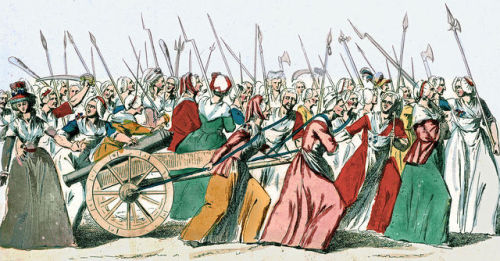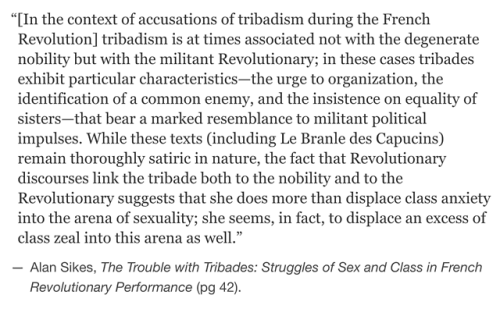The word ‘tribade’ has such an interesting, and at times disturbing, history. The f
The word ‘tribade’ has such an interesting, and at times disturbing, history. The female category of the tribade was created by men for men (Thorsteinn Vilhjalmsson, The Tribadic Tradition: The Reception of an Ancient Discourse on Female Homosexuality). The word tribade hails from Greek antiquity. It was applied by men to women who they deemed too ‘masculine’ (unruly, unwomanly, ‘overly’ sexual, etc). The insult is exceptionally derogatory and sexual. The idea was that masculinized women were so masculine that they had to be engaging in genital rubbing/penetration with men and women using their enlarged clitorises (yeahhhhh D;). During later antiquity, the sexual associations of the word became female-exclusive and limited to female same-sex genital rubbing/penetration. Homoeroticism between women was characterized as a monstrous, laughable, and inept effort committed in lapses (or within the absence of) womanliness. The discourse of the tribade, unlike discourses on male same-sex sexuality that changed with the passing of time after antiquity, survived into modernity (Vilhjalmsson, The Tribadic Tradition). The term popped back up during the Renaissance and became the dominant discourse of female same-sex sexuality into the 19th century. The word tribade and all its associations were the dominant means of discussing female same-sex sexuality for the time period. Oof. Of course, during the French Revolution, the word tribade was thrown around too! Accusations of tribadism were levied at both noble and Revolutionary women, indicating powerful anxiety over women’s sexualities, as well as anxiety over the stability of class allegiances. -- source link
Tumblr Blog : unspeakablevice.tumblr.com
#queer history#tribadism#french revolution#ladies#18th century#ancient greece#19th century#class politics#alan sikes#thorsteinn vilhjalmsson

